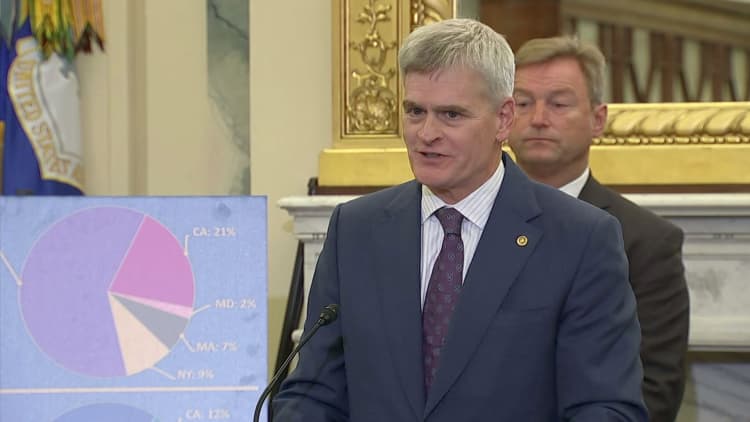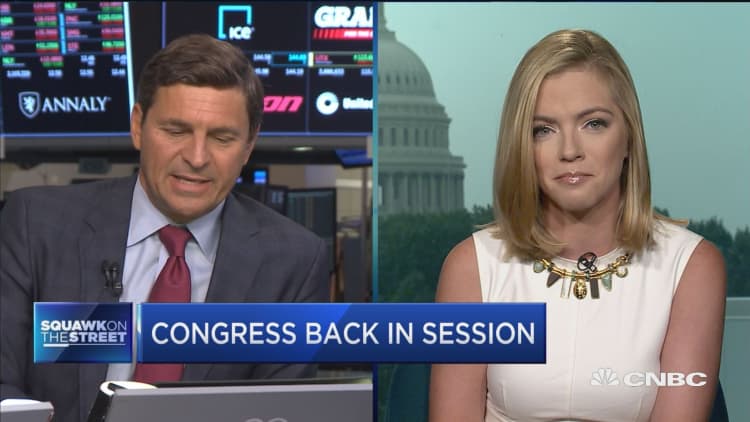
President Donald Trump tweeted Sunday evening that Alaska, Arizona, Maine and Kentucky would be big winners under the Graham-Cassidy bill to repeal and replace Obamacare, pointedly mentioning states of four senators who have either said they are against or are leaning against the bill.
It would appear that the president was referring to funding revisions in Sunday's draft of the bill, a copy of which was obtained by CNBC.
The amendments would improve funding for the four states whose senators have opposed the legislation, specifically benefiting low-density population states such as Alaska and Maine. Another provision would allow Native Americans who obtained health coverage under the Affordable Care Act's Medicaid expansion to retain coverage under traditional Medicaid.
As a result of the revisions, Alaska would see $1.4 billion more in federal Medicaid funding between 2020-2026, or a 3 percent increase compared with Obamacare over the period, according to a worksheet reportedly prepared by Trump administration health officials. Under the original bill, Alaska stood to lose roughly $2 billion.
The three other states would also gain. Arizona would gain $4.2 billion under the new draft calculations, roughly 14 percent, compared with a loss of $19 billion under the original plan. Maine stood to lose $2 billion between 2020-2027, but under the revised draft would gain nearly $1.5 billion. Kentucky would go from losing roughly $11 billion compared with Obamacare, to gaining $1.1 billion or 4 percent.

Still, Sen. Susan Collins said Sunday she was inclined to vote against the legislation because of the changes in Medicaid funding that would result in cuts for millions of Americans.
"It is very difficult for me to envision a scenario where I would end up voting for this bill," the Maine Republican said on CNN.
Collins said she expected to hear from the Congressional Budget Office on Monday about the bill, but because of so many last minute changes, it was possible that the agency may not be able to be able to come up with a complete report on the costs in time for a vote this week.
Time is of the essence to pass the bill with a simple majority. Under normal rules, the legislation requires a 60-vote majority in the 100-member Senate. Budget reconciliation rules that allow only a simple majority expire Saturday. The Senate's 48 Democrats and independents are unified in their opposition to the bill.
That means the GOP leadership can afford to lose only two Republican votes to approve the legislation, with Vice President Mike Pence casting a tie-breaking vote.
On Sunday, it was not clear that the GOP had votes. Sen. John McCain, R-Ariz., said Friday he would vote no because of the rushed nature of the process, with no hearings and potentially no CBO score.
Sen. Rand Paul, R-Ky., said Sunday he opposed the legislation because it simply turned over funding for Obamacare to the states.
Health groups are putting on a full-court press to get senators to vote against the bill. Over the weekend, the major health insurance, physician, and hospital groups issued an extraordinary joint statement opposing the bill and urging the Senate to push for a bipartisan plan.
"While we sometimes disagree on important issues in health care, we are in total agreement that Americans deserve a stable healthcare market that provides access to high-quality care and affordable coverage for all. The Graham-Cassidy … bill does not move us closer to that goal. The Senate should reject it," the statement said.
Correction: This story was revised to correct in a summary line that a simple majority is needed for passage by Saturday.


